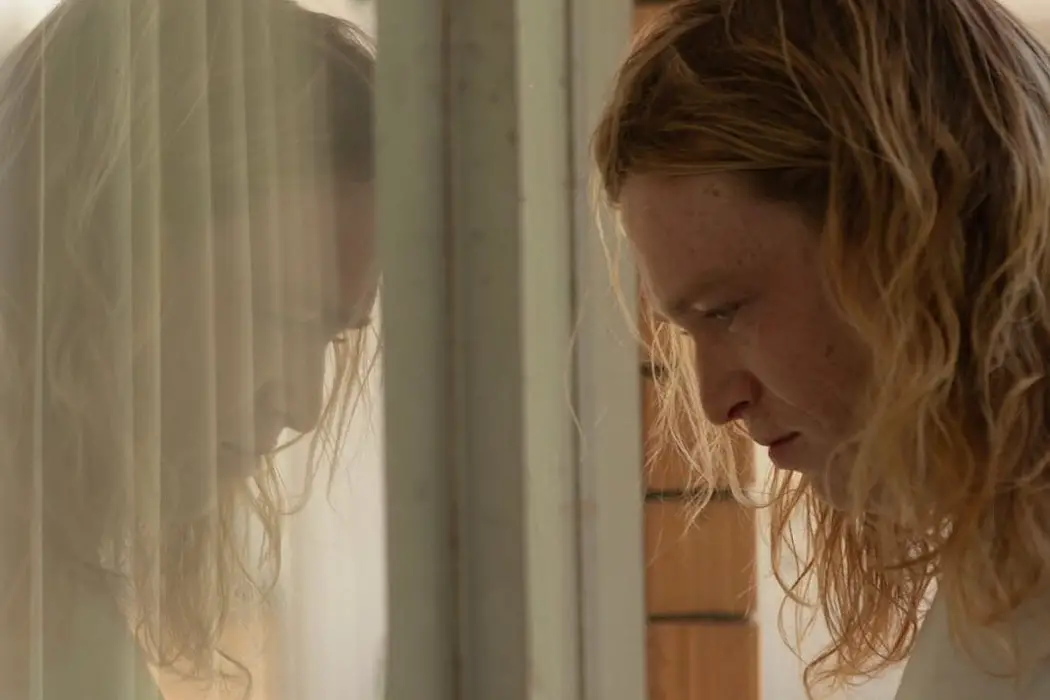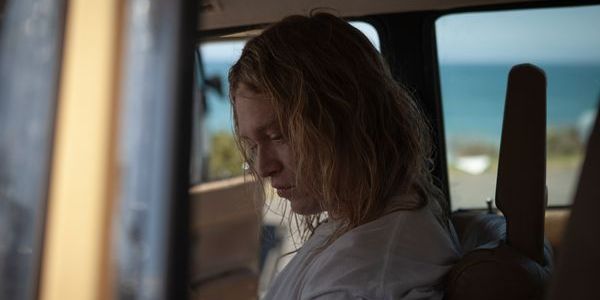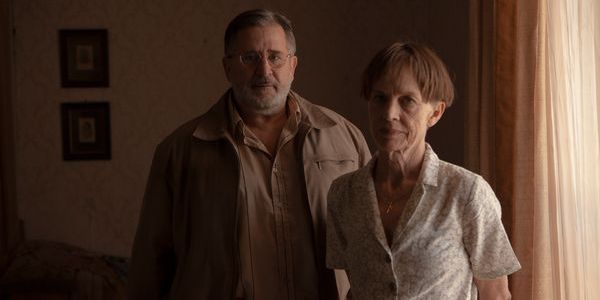“I Knew That It Was Going To Ask Of Me, Probably, More Than What I Had Been Asked Of Before.” Interview With Caleb Landry Jones For NITRAM

Kristy Strouse is the Owner/Editor in Chief of Film Inquiry,…
Nitram, influenced by real and horrific events that occurred in Port Arthur Australia in 1996, is one of the most impactful and unsettling films I have seen as of late. The film changes the names, but many of the details and the intense experiences leading up to it are the same.
It’s a heartwrenching watch, rightfully so, as we see this troubled young boy grow into an even more troubled young man. A big part of what compels you to continue to watch is both the strength of the direction by Justin Kurzel and by the central performance of Nitram by Caleb Landry Jones. Easily one of the best performances I have seen this year, it’ll challenge you, peck away at you, all the way until its dreadfully hard to swallow, end. It’ll stick with you for a long time after the credits.
I was able to sit down with the actor and talk about his first hesitations, preparations for the character, as well as diving into some levity amid it all, with a consideration of what’s next in his career!
This interview has been edited for clarity:
Hello, this is Kristy Strouse with Film Inquiry. How are you doing? Thanks for talking to me today!
Caleb Landry Jones: Good, how are you?
Good, thanks! So, when you got this script, what was your first impression?
Caleb Landry Jones: I’m a guy from Texas, that some Aussie’s are wanting to talk to [laughs] for a movie about something that I knew nothing really about. I was nervous to read the script because I think after Get Out and stuff like that I was getting a lot of “he’s the crazy guy.” “He’s the guy that did it.” You know, [laughs] so I have been trying not to do as many of those. So then I looked up on the internet and read about Justin Kurzel‘s work, and I was going oh my gosh, this guy’s made some really, really rough stuff. I mean, he made Snowtown! Yeah, I mean the amount of that, that I was able to watch was really rough.

Yes it is.
Caleb Landry Jones: And so I was nervous about what it would be exactly other than a reenactment of some kind, which would be terrible. But my agent said, “Caleb, you’ve got to read it, you really have to read it, trust me, otherwise, it’s gone.” So I did. And then I thought, oh, it’s not that it’s, it’s something else, it was a character study. Not just on my part, but I feel like with Helen and, and mom and dad. So, it became more family drama, you know?
And then it became more apparent to me when I got there. And I realized it really is. It really is. [laughs] We’re dealing with the family, and we’re dealing with this, this young man. And working with Justin was making the film was probably the best experience I’ve ever had making, getting to be involved in a movie. I wouldn’t have thought that, but it really was really, really great. A great experience in a lot of ways.
So you were hesitant at first? Suffice to say.
Caleb Landry Jones: Yeah. But I’m always hesitant about… everything. [laughs]
I can understand that. How did you prepare for the role? How did you kind of get into the mind frame to play this sort of character?
Caleb Landry Jones: Well, Justin, put me in touch with Jenny Kent, who is a dialect coach in Australia. And she was incredible. And I never thought it was possible. But she proved me wrong. And that, I could do it. And so retraining the tongue and then and then Justin fed me a lot of material and then some activities and certain things that I think, started to make something that was for me very big, and he started to become a funnel. It started to become a bit more precise or something that I was able to see it. I don’t know how to talk about it really. It’s tough, but he gave me a lot of things to think about, I suppose, that I might not have been thinking about on my own already.
And then I was allowed to kind of go with these things, and figure it out for myself as well, which I think is why it was such a great experience as an actor for me, you know? Because of this, and someone who I was working with, who knew exactly what they wanted and what they were doing, and what he wanted from this film. But, also allowed me this space to find it for myself, which is really special I think, for an actor.
So the performance kind of evolved, and, and even helped you as an actor kind of grow in a lot of ways?
Caleb Landry Jones: I don’t know, I don’t know what I’m doing at all. [laughs] I just know that. I know that as soon as you start getting the reaction from some people that you kind of maybe imagined the character should be getting in the film, then something is good, then something’s working, you know?
Well, I could completely believe that you were from Australia. So if that means anything, you did a great job!
Caleb Landry Jones: Three months with Jenny Kent!
Did you have trouble with not talking with an accent after that?
Caleb Landry Jones: Not afterward, I just tried really hard not to do anything else but talk New Zealand. Just do that until I was done. And then once I was done, I think I was like… get it out, go get away from that. And I probably went stronger into my southern than normal. you know [does impression “Everything’s good, you know.”
Texas came back even bigger now. [laughs]
Caleb Landry Jones:Yes exactly. [laughs] A little too far. Maybe?
Extra Texas. That’s awesome. So when you’re dealing with such a sensitive subject, do you feel that there’s a lot more pressure with the performance?
Caleb Landry Jones: Yeah, absolutely. Yeah, big time. Um, but I was I knew that after meeting Justin and Shawn, I knew that Justin was going to ask more of me, probably, more than what I had been asked of before. But, it was also something I was looking forward to, I think, at the time, and I knew that the care and sensitivity that these men had for taking this on, that I could trust them. That at the end of the day, it was a film about people. And, and not something else. But trying to communicate, to others to let others in. Justin was very serious, and he was upset, and he needed to be, and I was upset. Being an American and not really knowing what that was I got an impression very quickly, from people there in the community and with how many people that didn’t want the movie made, and that were afraid of what the film could have been. Those same things that I was afraid of, you know. So, yeah, there’s a lot of pressure, but I think it’s a good sign that if there’s a lot of pressure, you’re probably doing something worthwhile, or maybe somewhat important, to some degree.
Yeah and something like this can, you know, make spark even more of a conversation about gun control.
Caleb Landry Jones: Yes, and I think society and us as human beings and problems inside the home and things that can be done so that other things don’t happen. So, that none of this happens, you know, because the attention was there beforehand. Or the protocols that were needed to take place. The help was there, you know, I think in our film if Niram had gotten help at different times. Like if Helen, if Jamie wasn’t such an asshole, you know, and really wanted to be friends with him. It could have changed everything in the film. I remember when doing research early on, and reading very little, it seems that there are many, many times where help could have been given. And either at the time it was harder to get that kind of help maybe, or other aspects that I don’t know so much about. But it was hard to see, to read things, and think “wow at eight years old” or “at 12, that was a moment.” That’s 14, hmm.” There was all the things that he was doing, he was saying, he needed help. And I don’t think he got it.
No, it’s heartbreaking. And I think this really is such a character study and s, it is trying to figure out who he is, his identity, but also his relationships as they play such a huge part (both of his parents in different ways and Helen). Did you think that that was kind of the basis and in a lot of ways of what the story was about, before its dark end?

Caleb Landry Jones: Yeah, I mean, I think very much so. And the first week, I got to work with Essie [Davis]. And so the first week was one kind of film in a way. And then the second week, Judy [Davis] and Anthony [LaPaglia], and then we’re getting into another kind of film. Very different. And to the extent where everything from me as an actor, is practical, and everything my characters is doing is practical for me, I suppose, in a way. But it’s only until you’re doing it, and the crew is feeling a certain way. I remember the first day that brought the guns out, things shifted, you know, things shifted within the crew.
Of course.
Caleb Landry Jones: Suddenly, there was another feeling there was something else now that and we hadn’t gotten there yet within the film, because we were shooting for the most part, in a linear way. But, for me, I’m trying to also find aspects of the character that probably not many folks are thinking about. Whether it’s his sense of humor, or what makes him smile or laugh, you know what I mean?
Yes, he’s still a person.
Caleb Landry Jones: Nobody thinks about one’s joy if there is any, you know, and where that comes from, and how one gets that. And so, and so for me, I’m almost unaware of the weight at different times, unlike the crew, who was very aware of the weight all the time. But, for me to play the part, I don’t think I can be, in a way. And yet, at the same time, I think he understood exactly what he was doing.
There is a balance for sure, everybody has those variations, colors, and things and variants in their personality. And, I think a lot of the relationship with Helen especially, and some with the parents as well show different sides. You did a great job!
Now, since we only have one more question let’s go a little lighter, what’s next for you? I know you’re a musician too?
Caleb Landry Jones:Oh yeah, always, especially lately since I have been releasing stuff. There is always music being worked on. I am about to head off to Paris to work on a film with Luc Besson, about a man and a bunch of dogs. [Laughs] So more dogs on my plate.
Are you gonna be walking 10 at a time again?
Caleb Landry Jones: Oh, no, no, I won’t. There’ll be no leashes in this. [laughs]
So mysterious. I love it. Well, thank you very, very much for talking to me. It’s been a big pleasure and I wish you the best of luck. Thank you!
Caleb Landry Jones: I hope I answered okay it’s tough to talk about!
I know, but you did great and it was really nice meeting you!
Caleb Landry Jones: You too Kristy!
Film Inquiry would like to thank Caleb Landry Jones for taking the time to speak with us.
NITRAM is now in theaters, digital rental and AMC+ WEBSITE:
Does content like this matter to you?
Become a Member and support film journalism. Unlock access to all of Film Inquiry`s great articles. Join a community of like-minded readers who are passionate about cinema - get access to our private members Network, give back to independent filmmakers, and more.
Kristy Strouse is the Owner/Editor in Chief of Film Inquiry, writer, podcaster, and all around film and TV fanatic. She's also VP of Genomic Operations at Katch Data and is a member of The Online Association of Female Film Critics and The Hollywood Creative Alliance. She also has a horror website: Wonderfully Weird & Horrifying.












